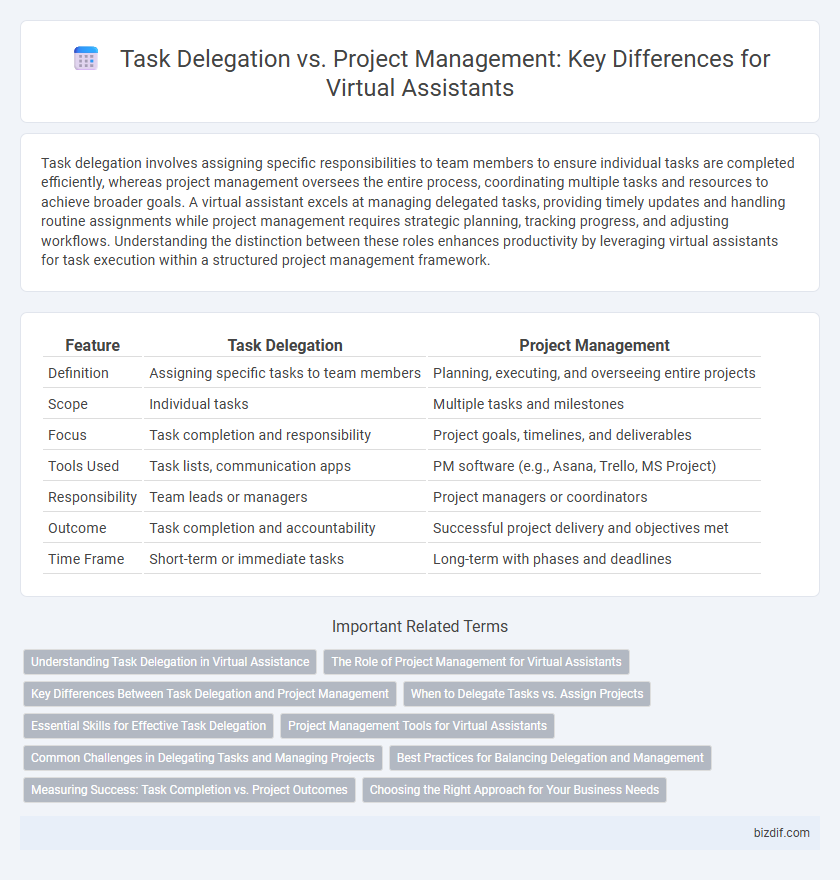Task delegation involves assigning specific responsibilities to team members to ensure individual tasks are completed efficiently, whereas project management oversees the entire process, coordinating multiple tasks and resources to achieve broader goals. A virtual assistant excels at managing delegated tasks, providing timely updates and handling routine assignments while project management requires strategic planning, tracking progress, and adjusting workflows. Understanding the distinction between these roles enhances productivity by leveraging virtual assistants for task execution within a structured project management framework.
Table of Comparison
| Feature | Task Delegation | Project Management |
|---|---|---|
| Definition | Assigning specific tasks to team members | Planning, executing, and overseeing entire projects |
| Scope | Individual tasks | Multiple tasks and milestones |
| Focus | Task completion and responsibility | Project goals, timelines, and deliverables |
| Tools Used | Task lists, communication apps | PM software (e.g., Asana, Trello, MS Project) |
| Responsibility | Team leads or managers | Project managers or coordinators |
| Outcome | Task completion and accountability | Successful project delivery and objectives met |
| Time Frame | Short-term or immediate tasks | Long-term with phases and deadlines |
Understanding Task Delegation in Virtual Assistance
Task delegation in virtual assistance involves assigning specific, well-defined tasks to remote team members based on their skills and availability, ensuring efficient workload distribution and timely completion. Unlike broader project management, which oversees entire projects from initiation to closure, task delegation focuses on clear instruction and accountability for individual responsibilities. Effective task delegation enhances productivity by minimizing communication delays and leveraging specialized virtual assistants' expertise.
The Role of Project Management for Virtual Assistants
Project management for virtual assistants involves organizing, prioritizing, and overseeing multiple tasks to ensure timely and efficient completion of client objectives. Effective project management tools like Asana, Trello, or Monday.com enable virtual assistants to delegate specific tasks, track progress, and facilitate communication across distributed teams. Mastery of project management principles enhances a virtual assistant's ability to deliver structured workflows, improve productivity, and maintain consistent quality in remote work environments.
Key Differences Between Task Delegation and Project Management
Task delegation involves assigning specific tasks or responsibilities to individuals to ensure efficient completion, while project management encompasses planning, organizing, and overseeing an entire project from inception to completion. Task delegation is a subset of project management that focuses on distributing workload, whereas project management includes resource allocation, timeline setting, risk management, and quality control. Understanding these key differences helps virtual assistants prioritize duties and manage workflows more effectively in diverse business environments.
When to Delegate Tasks vs. Assign Projects
Task delegation is ideal for routine or specific actions requiring immediate completion, enabling virtual assistants to manage time-sensitive or repetitive workloads efficiently. Assigning projects suits broader objectives involving multiple steps and coordination, allowing virtual assistants to oversee progress, deadlines, and resource allocation. Strategic use of task delegation versus project management enhances productivity by matching the complexity and scope of work with the appropriate management approach.
Essential Skills for Effective Task Delegation
Effective task delegation requires clear communication, strong organizational abilities, and the capacity to assess individual team members' strengths and workloads accurately. Virtual assistants must prioritize time management and accountability to ensure delegated tasks are completed efficiently and meet quality standards. Mastery of digital collaboration tools enhances tracking progress and facilitates seamless handoffs between team members.
Project Management Tools for Virtual Assistants
Project management tools for virtual assistants streamline task tracking, communication, and deadline management, enhancing productivity and collaboration. Platforms like Trello, Asana, and ClickUp provide customizable boards, task dependencies, and real-time updates tailored for virtual assistance workflows. Implementing these tools optimizes project visibility, ensuring efficient delegation and timely completion of complex projects.
Common Challenges in Delegating Tasks and Managing Projects
Task delegation often faces challenges such as unclear communication, lack of accountability, and mismatched skill sets, which can lead to missed deadlines and reduced productivity. Project management struggles with scope creep, resource allocation, and maintaining team collaboration across multiple tasks, impacting overall project success. Virtual assistants must navigate these issues by implementing clear instructions, setting measurable goals, and utilizing project management tools to streamline workflows and ensure timely completion.
Best Practices for Balancing Delegation and Management
Effective task delegation involves clearly defining responsibilities, setting realistic deadlines, and providing the virtual assistant with the necessary resources to complete tasks efficiently. Project management requires continuous monitoring of progress, regular communication, and adjustment of priorities to ensure alignment with overall objectives. Balancing delegation and management optimizes productivity by empowering the assistant while maintaining oversight to prevent bottlenecks and ensure timely delivery.
Measuring Success: Task Completion vs. Project Outcomes
Measuring success in task delegation emphasizes tracking task completion rates, ensuring each individual assignment is finished accurately and on time. Project management metrics prioritize evaluating overall project outcomes, including goal achievement, budget adherence, and stakeholder satisfaction. Effective virtual assistants balance both by monitoring task progress while aligning their efforts with broader project objectives.
Choosing the Right Approach for Your Business Needs
Effective task delegation streamlines routine activities by assigning specific responsibilities to virtual assistants, enhancing productivity and reducing workload. Project management, on the other hand, involves overseeing complex initiatives with defined timelines, milestones, and cross-functional collaboration, ideal for larger or multi-phase projects. Selecting the right approach depends on your business size, project complexity, and the level of oversight required to achieve optimal results.
Task Delegation vs Project Management Infographic

 bizdif.com
bizdif.com